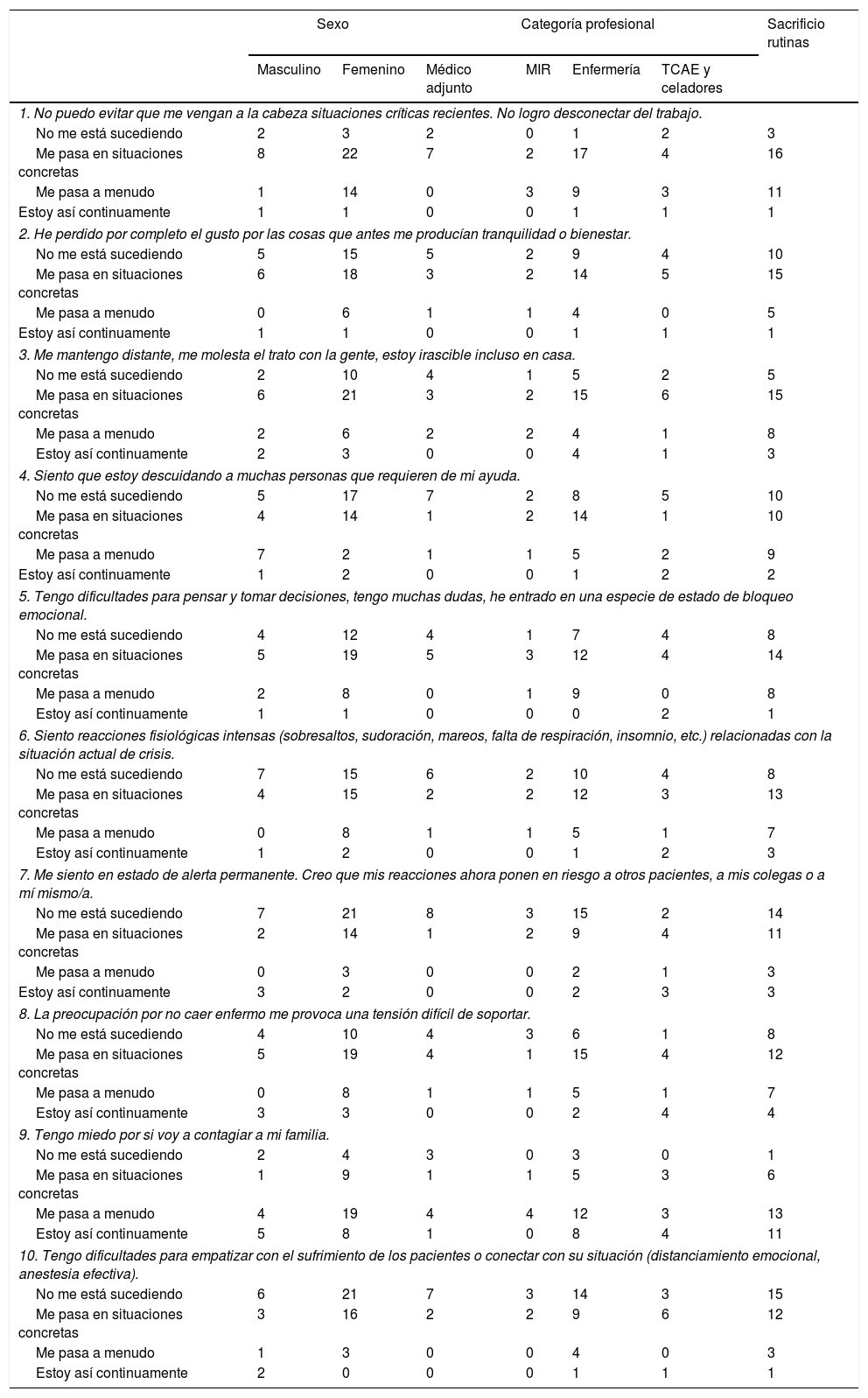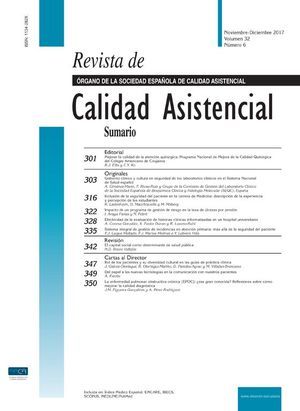La epidemia por el virus SARS-CoV-2 ha generado una situación extraordinaria en la asistencia sanitaria de nuestro país. La enorme sobrecarga de trabajo a la que han estado expuestos los profesionales sanitarios, la importante carga emocional, las situaciones estresantes y el miedo al contagio propio y de sus familiares, entre otros aspectos, han podido tener consecuencias en los profesionales, convirtiéndolos en segundas víctimas. El objetivo de este estudio es conocer la sobrecarga emocional de los trabajadores de áreas de pacientes críticos por SARS-CoV-2 en un hospital terciario de la Comunidad de Madrid.
Materiales y métodosEstudio descriptivo transversal, realizado mediante la cumplimentación voluntaria por parte de los profesionales de áreas de cuidados críticos de un cuestionario adaptado a partir de la Escala de Estrés Agudo «EASE COVID-19», consistente en 10 preguntas cerradas tipo Likert a las que se añadieron cuatro preguntas: sexo, categoría profesional, si trabajan habitualmente en áreas de críticos y el sacrificio en sus rutinas. Los datos se recogieron en julio de 2020, para evaluar el impacto de la primera ola. Se realizó una descripción de los datos y se analizó la asociación entre las variables y la respuesta emocional.
ResultadosUn 54% de los encuestados mostró buen ajuste emocional. Lo que más preocupó a los participantes fue la posibilidad de contagiar a sus familiares. Los colectivos con puntuaciones medias más altas fueron los enfermeros, técnicos en cuidados auxiliares de enfermería (TCAE) y celadores, mostrando ajuste emocional el 100% de los médicos, sin encontrarse diferencias por sexo. El 60% de los participantes modificó su rutina familiar, siendo los médicos internos residentes (MIR) los que presentaron mayor porcentaje.
ConclusionesLa crisis sanitaria vivida ha convertido a los profesionales sanitarios en segundas víctimas del SARS-CoV-2. Su detección es fundamental para ofrecerles los recursos y ayuda necesaria para garantizar su bienestar emocional, eliminando barreras y ayudándoles a salir reforzados.
SARS-CoV-2 epidemic has caused an exceptional situation in our country's healthcare system. Healthcare workers could become the second victims as consequence of this pandemic circumstances, such as: the huge work overload that healthcare workers have been exposed to, the excessive emotional overload, the stressful situations and the fear of being infected themselves and to infect their families. The aim of this study is to know the emotional overload of workers in intensive care units during SARS-CoV-2 epidemic in a tertiary hospital in the Community of Madrid.
Material and methodsDescriptive cross-sectional study, carried out through the voluntary completion by workers in intensive care units of a questionnaire adapted from the Acute Stress Scale «EASE COVID-19», with 10 closed-ended Likert scale questions, adding four questions: sex, professional category, if they usually work in intensive care units and the sacrifice in their routines. Data were collected in July 2020, to assess the impact of the first wave. A descriptive analysis was carried out as well as an analysis of the possible links between the collected variables and the emotional response.
ResultsFifty-four percent of surveyed respondents showed good emotional adjustment. The major concern of the participants was the possibility of infecting their families. The highest scores by categories were observed in nurses, assistant nursing care technicians and orderlies, while 100% of doctors showed good emotional adjustment, with no differences between genders. Sixty percent of participants modified their family routine, being medical residents who got the highest percentage.
ConclusionsSanitary crisis has turned healthcare workers into second victims of SARS-CoV-2. Their detection is essential to offer them help and resources to ensure their emotional well-being, removing barriers and helping them to be strengthened.










